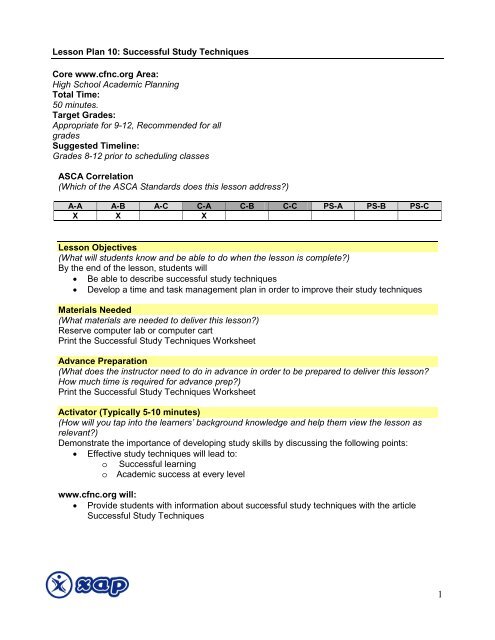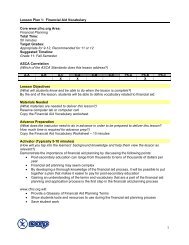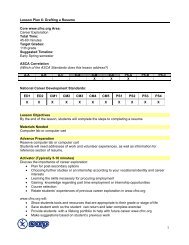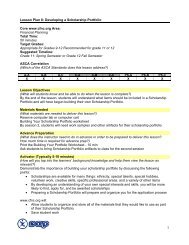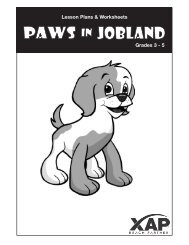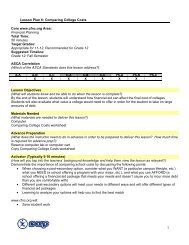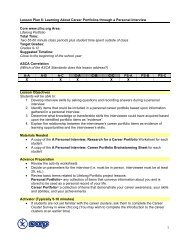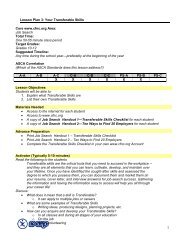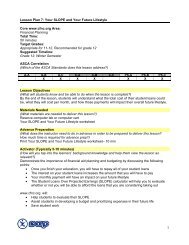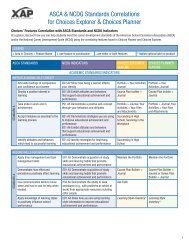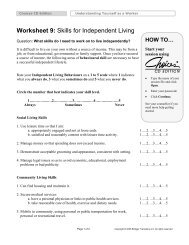Lesson Plan 10: Successful Study Techniques Core www ... - Bridges
Lesson Plan 10: Successful Study Techniques Core www ... - Bridges
Lesson Plan 10: Successful Study Techniques Core www ... - Bridges
Create successful ePaper yourself
Turn your PDF publications into a flip-book with our unique Google optimized e-Paper software.
<strong>Lesson</strong> <strong>Plan</strong> <strong>10</strong>: <strong>Successful</strong> <strong>Study</strong> <strong>Techniques</strong><br />
<strong>Core</strong> <strong>www</strong>.cfnc.org Area:<br />
High School Academic <strong>Plan</strong>ning<br />
Total Time:<br />
50 minutes.<br />
Target Grades:<br />
Appropriate for 9-12, Recommended for all<br />
grades<br />
Suggested Timeline:<br />
Grades 8-12 prior to scheduling classes<br />
ASCA Correlation<br />
(Which of the ASCA Standards does this lesson address?)<br />
A-A A-B A-C C-A C-B C-C PS-A PS-B PS-C<br />
X X X<br />
<strong>Lesson</strong> Objectives<br />
(What will students know and be able to do when the lesson is complete?)<br />
By the end of the lesson, students will<br />
• Be able to describe successful study techniques<br />
• Develop a time and task management plan in order to improve their study techniques<br />
Materials Needed<br />
(What materials are needed to deliver this lesson?)<br />
Reserve computer lab or computer cart<br />
Print the <strong>Successful</strong> <strong>Study</strong> <strong>Techniques</strong> Worksheet<br />
Advance Preparation<br />
(What does the instructor need to do in advance in order to be prepared to deliver this lesson?<br />
How much time is required for advance prep?)<br />
Print the <strong>Successful</strong> <strong>Study</strong> <strong>Techniques</strong> Worksheet<br />
Activator (Typically 5-<strong>10</strong> minutes)<br />
(How will you tap into the learners’ background knowledge and help them view the lesson as<br />
relevant?)<br />
Demonstrate the importance of developing study skills by discussing the following points:<br />
• Effective study techniques will lead to:<br />
o <strong>Successful</strong> learning<br />
o Academic success at every level<br />
<strong>www</strong>.cfnc.org will:<br />
• Provide students with information about successful study techniques with the article<br />
<strong>Successful</strong> <strong>Study</strong> <strong>Techniques</strong><br />
1
<strong>Core</strong> Learning Strategies/<strong>Lesson</strong> Activities (Typically 30-40 minutes)<br />
(How will you facilitate the learning of knowledge/skills using adult learning strategies? How will<br />
you provide for skill practice? How will you differentiate learning, as appropriate, for different<br />
roles, skill levels, and experience?)<br />
Session # Step # Responsibility Action Steps<br />
1 1 School<br />
counselor<br />
• Focus on today’s work:<br />
1. Asks students to log into their <strong>www</strong>.cfnc.org<br />
account<br />
2. Asks students to click on the High School<br />
<strong>Plan</strong>ning tab and then on the High School<br />
<strong>Plan</strong>ning Timeline<br />
3. Asks students to click on their grade level<br />
4. Asks students to click on the article (listed<br />
on the right side of the page) <strong>Successful</strong><br />
<strong>Study</strong> <strong>Techniques</strong><br />
2 Student • Reads the article <strong>Successful</strong> <strong>Study</strong><br />
<strong>Techniques</strong><br />
• Completes the <strong>Successful</strong> <strong>Study</strong> <strong>Techniques</strong><br />
Worksheet<br />
3 Counselor • Assists students with answering the questions<br />
and filling out all information<br />
4 Student • Completes reflection question in the Your<br />
Journal section of Your Portfolio tab of<br />
<strong>www</strong>.cfnc.org “Does the career plan that you<br />
have just created accurately show what you<br />
want your life to look like now and in the<br />
future? What steps are you taking now to<br />
achieve the goals laid out in this plan?”<br />
(chart from RI School Counselor Association’s Toolkits, found at <strong>www</strong>.rischoolcounselor.org)<br />
Summarizer/Informal Assessment (Typically 5-<strong>10</strong> minutes)<br />
(How will you engage learners in processing and summarizing what they learned? How will you<br />
know that the objective has been achieved?)<br />
• Ask students to discuss what steps they can take now to begin putting their plan into<br />
action<br />
• Ask students to discuss how the development of a course plan that connects to<br />
career goals is important to their overall plan<br />
Follow-Up<br />
(What additional learning could occur during the year? When?)<br />
• Student can review their Career <strong>Plan</strong> before creating/confirming their schedule for the<br />
upcoming school year.<br />
2
<strong>Successful</strong> <strong>Study</strong> <strong>Techniques</strong><br />
Read the article <strong>Successful</strong> <strong>Study</strong> <strong>Techniques</strong> and complete the information to answer the<br />
questions and complete the activities below.<br />
Part 1: Getting Started<br />
1. Log into your <strong>www</strong>.cfnc.org Account<br />
2. Click on the High School <strong>Plan</strong>ning Tab at the top of the page, then click High School<br />
<strong>Plan</strong>ning Timeline<br />
3. Select your grade level and click on the article <strong>Successful</strong> <strong>Study</strong> <strong>Techniques</strong>. (Note –<br />
this article does not appear in grade 12)<br />
4. Read the article and answer the questions below<br />
Part 2: <strong>Successful</strong> <strong>Study</strong> <strong>Techniques</strong><br />
1. List the four main techniques that you can use to ensure that you know what you need to<br />
study<br />
a. )<br />
b. )<br />
c. )<br />
d. )<br />
2. What 3 things does the ability to concentrate depend on?<br />
3. How often should you review you class notes and readings?<br />
4. Why should you create a study schedule?<br />
5. Describe 2 methods of developing a study schedule<br />
6. What is the best study environment?<br />
7. List five ways that you can study actively<br />
a. )<br />
b. )<br />
c. )<br />
d. )<br />
e. )<br />
8. Create an mnemonic device (a rhyme, sentence, word or phrase – review the article for<br />
examples) that will remind you of the five active study techniques that you just listed.<br />
3
Create a <strong>Study</strong> Schedule<br />
In the article, <strong>Successful</strong> <strong>Study</strong> <strong>Techniques</strong>, you learned that developing a study<br />
schedule will help you to break up your studying into manageable chunks and will help<br />
you to better manage your time. Fill out the following schedule below by filling in all of<br />
your required activities (school, work, practices, rehearsals, etc.) and then scheduling a<br />
specific time to study for each of your classes. You can schedule social events in the<br />
time that you have left.<br />
6:00 am<br />
Sunday Monday Tuesday Wednesday Thursday Friday Saturday<br />
7:00 am<br />
8:00 am<br />
9:00 am<br />
<strong>10</strong>:00<br />
am<br />
11:00<br />
am<br />
Noon<br />
1:00 pm<br />
2:00 pm<br />
3:00 pm<br />
4:00 pm<br />
5:00 pm<br />
6:00 pm<br />
7:00 pm<br />
8:00 pm<br />
9:00 pm<br />
<strong>10</strong>:00<br />
pm<br />
11:00<br />
pm<br />
Midnight<br />
4


